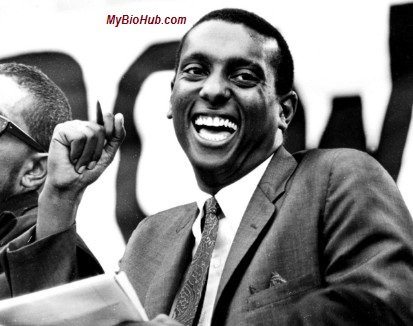Kwame Ture was born as Stokely Carmichael on 29 June, 1941 in Port of Spain. Stokely had three sisters, he attended Tranquility School there before moving to Harlem, New York, in 1952 at the age of 11, to rejoin his parents who had immigrated to the United States when he was age two, leaving him with his grandmother and two aunts.
He was a Trinidadian who became a prominent figure in the Civil Rights Movement and the global Pan-African movement. He grew up in the United States from the age of 11 and became an activist while he attended Howard University. He would eventually become active in the Black Power movement, first as a leader of the Student Nonviolent Coordinating Committee (SNCC), later as the “Honorary Prime Minister” of the Black Panther Party (BPP), and lastly as a leader of the All-African People’s Revolutionary Party (A-APRP).
His mother Mabel R. Carmichael was a stewardess for a steamship line. His father Adolphus was a carpenter who also worked as a taxi driver. Carmichael was the only black member of the Morris Park Dukes, a youth gang involved in alcohol and petty theft. He and his family were members of the Westchester United Methodist Church.
In his first year at the university, in 1961, he participated in the Freedom Rides of the Congress of Racial Equality (CORE) to desegregate the bus station restaurants along U.S. Route 40 between Baltimore and Washington, D.C. and was frequently arrested, spending time in jail. He was arrested so many times for his activism that he lost count, sometimes estimating at least 29 or 32. In 1998, he told the Washington Post that he thought the total was fewer than 36.
In 1964, Carmichael became a full-time field organizer for SNCC in Mississippi. He worked on the Greenwood voting rights project under Robert Parris Moses. He also worked closely with Gloria Richardson, who led the SNCC chapter in Cambridge, Maryland. During a protest with Richardson in Maryland in June 1964, Carmichael was hit directly in a chemical gas attack by the National Guard and had to be hospitalized.
He soon became project director for Mississippi’s 2nd congressional district, made up largely in the counties of the Mississippi Delta. At that time, most blacks in Mississippi were still disenfranchised. The summer project was to prepare them to register to vote and to conduct a parallel registration movement to demonstrate how much people wanted to vote.
Till his death on 15 November, 1998, Stokely remained a notable political and human right activist both within and without Africa.
– November 15, 1998)



